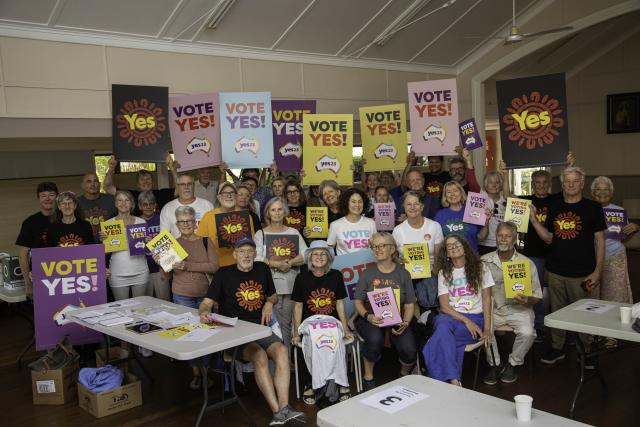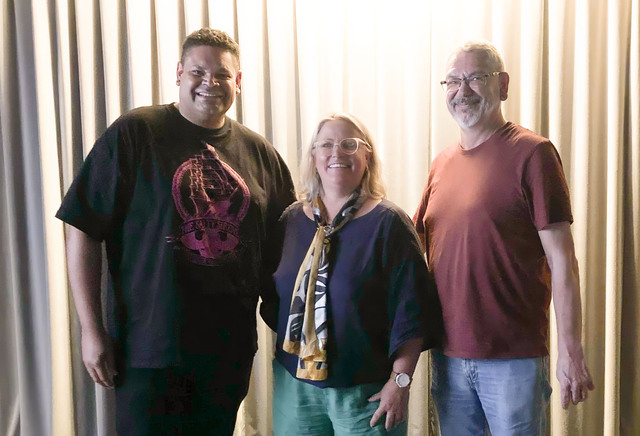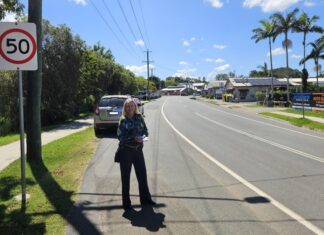Racism, reconciliation, the Voice referendum, politics, connecting with Aboriginal people and human rights were issues raised last week in Noosa Junction at a special evening featuring a screening of the award-winning Indigenous-funded documentary Ḻuku Ngärra: The Law of the Land and the discussion that followed.
Winner of the Change Award at Adelaide Film Festival and the Human Rights Awards at Montreal Independent Film Festival, Ḻuku Ngärra: The Law of the Land is the extraordinary story of one Yolŋu Elder’s 45 year journey fighting for the political and spiritual freedom of his people.
Unflinching in his delivery and integrity, yet soft in his humanity, Reverend Dr Gondarra’s confronting and urgent message for Australians and the world as he questions the long standing paradigm that controls us all.
Rev Dr Gondarra OAM, an initiated clan leader within the Yolŋu Nation, spent the most part of his 79 years of life as a civil rights activist, a spiritual leader, a cross cultural mediator, an educator and one of few Elders who has dedicated his life to upholding the traditional law of his people.
Filmed over five years in Northeast Arnhem Land and as a result of a 16 year friendship between Dr Gondarra and Director Sinem Saban, the film presents an intimate exploration of Yolŋu law and how it has kept their people in balance with the environment and with each other for over tens of thousands of years.
With the onset of colonisation and the enforcement of its ideologies and laws, the film illuminates how this foreign system that is so completely at odds with their own has created chaos to their lives, their spirituality and the environment.
Through the first-hand experience living between two worlds and the pool of wisdom that comes from such an experience, Dr Gondarra demands that we ask the big questions around what is law, what is freedom and who is really in control of our lives?
Following the film special guests First Nations senior advisor Stephen Mann (SM) and Queensland coordinator for Yes23 campaign, First Nations Justice campaign director, Get Up, Jason Field (JF) and Noosa First Nations Allies Chair Sharon Wright took questions from a full house of guests.
Q: What is the way forward after the Yes23 campaign?
SM: I acknowledge the Kabi Kabi peoples and in doing this we recognise and acknowledge that what our ancestors achieved benefits what we achieved today for our future generations. When I saw that film there was a story that stuck in my mind which was the footsteps on the beach. Today an elder would walk those footsteps that their parents led them so that those elder’s children can walk those footsteps and that their grandchildren can walk those footsteps and if there is no one there to walk those footsteps how will people know? But the power of it is that all the generations are connected in time through this place, through country, that we walk through those same footsteps. When I think about everything in that film and it is so deep, so powerful, so moving that in these communities that some will say Aboriginal people will sit on these committees and councils but much of the time they don’t own the land. Those houses they live in they don’t own. The infrastructure in the community is ailing because they don’t have enough money, they don’t have the industry to support social economic need in the community. What I think is needed is to listen, to come together, to reframe a relationship with First Nations People, for each of us to reframe a relationship with this country and with ourselves, who we are, where are we placed on this land. That what is needed is enduring relationships. We need to understand what it means to have a partnership, to form a community, to live and breath as a family that not only looks after each other but looks after this country.
JF: I look at it from a different perspective and think perhaps our expectations are just a bit too high sometimes. We think that they listen and they’re responding but more often than not what they’re doing is putting our views, our ideas, our aspirations into their own world view and then tossing it around and saying, no that won’t work for you, rather than actually listening to us and our people and elders and really taking that on board. I think one of the problems we face is that we’re just a bit too nice about it. We just say, aw, yeah, we had a referendum, that was defeated, we move on, and we have to move on, but what we don’t talk about is the racism that came out of that whole debate, the horrendous attitudes similar to what give rise to the Northern Territory Intervention. These are some of the discussions we just don’t have. If you look at where we are politically since losing the referendum we now have state and territory governments ramping up law and order again and using the imagery of Aboriginal young people to justify a hard line and basically criminalise as many young Aboriginal people as possible. And we have a federal government that is walking away from commitments like truth telling, like treaty. This is that inertia it often creates, when we think we’re moving forward but the political elite systems that we’re living under just cast us aside and stop that momentum. I think a lot of it comes back to a challenge for us, how do we keep that momentum going and keep fighting the fight.
Q: We came to the country in 1985. There was always the image of Indigenous people being drunk. It never felt right. We never saw any of them. It came to us that the land was more important to (the government) for mining than the people on the land.
JF: Stop mining for a start, but being realistic that’s not going to happen any time soon. I think one of the critical issues in relation to the destruction of country through mining and other activities is that we have these approval processes that these companies and organisations have to go through. These processes in place are really terrible. They’re incredibly unfair. A lot of the way they have is before the approval gets to the point of being close to a decision these companies are pouring millions if not billions of dollars. When it comes to talking to traditional owners, they say how do you feel about that. Well we don’t feel too good because that mine is going to impact upon our water supply, on that river, on dreaming stories and by the way there’s some cultural sites over here that it might impact and in addition we have a connection to this country. We need this country to survive and that’s generally completely disregarded, so I think that where there’s a real opportunity there is in relation to our environmental planning systems where we can really first of all prioritise the protection of country and cultural heritage and then try and map it early on so when people come in and look at developing they can be given the information up front, this is going to cause delays. think of somewhere else, think of opportunities for people to be able to negotiate is where we need to be thinking about it.
SM: I think we need to start approaching this as a disaster. This is a disaster that has been going on over 200 years and we need to put people first. When there’s a cyclone or a bush fire or a flood we’re very good at putting people first, but when it’s Indigenous people, out of sight, out of mind we forget there are people there too.
Q: Do you have any ideas to eliminate racism? We need to change the direction it goes. I was surprised pre the referendum so many of my friends were so racist, so white. That concerned me considerably. I thought they were thinking people, understanding people, considerate of others. They considered other nations across the globe but not our own indigenous people.
SM: I don’t mean to oversimplify it because it’s obviously a very complex issue, but I think we need to be teaching people more how to love and teaching people to stop the hate, because that division and that approach of calling out people as hard-lined or aggressive or angry or crazy, that approach is about radicalising the minority, by shooting them out of existence, quietening their voice, silencing their voice. And I think probably the biggest thing anyone can do is call out that inappropriate behaviour when it happens.
JF: I think one of the things that is disturbing me is just the levels of misinformation and disinformation that are going on these days. It’s loaded with racism but there’s just this real desire and intent to really undermine the integrity of First Peoples across this country within certain elements of our society and absolutely we have to call it out. I had hoped that over time the country would become less racist but I’m not saying that I feel that way anymore. I don’t really have any answers on that one.
Audience member: I agree there was a lot of racism and I think one of the answers is, it’s very important we have connection with Indigenous and we have to have education. We have to educate our children.
JF: I absolutely agree but if you look at it the big push in education now people are getting angry because we’re teaching Aboriginal history, we’re teaching how Indigenous people were colonised. I see 40 per cent of Australian connected with Indigenous at the last referendum, it’s just 11 per cent more you’ve got to get over the line then it might become more of a majority political power.
Q: Is it important for children in primary school to learn Dreamtime stuff as an introduction to culture?
JF: I think it’s really important for young people to be connected to country, to be guided by Aboriginal elders on country and to bring our relatives into the system so they can learn about country through that system. I take the approach of educating our child through Montessori because it was a system most connected with our understanding of Aboriginal child development approaches. A big part of education is being out in country, learning about nature and I think if we took that approach it would be a real beneficial thing to do.
SM: I also support that it’s absolutely important people get out on country, connect with Aboriginal people, listen to those stories, but all of us here have a tradition of story telling and there’s a purpose to that story telling. We need to reconnect with who we are as human beings, our soul to try and free ourselves from some of the distractions in this world that are made by people and find that inner child in all of us, the innocence, the truth, connect with our emotions and that honesty, to really reflect on who we want to be.
Q: What are your thoughts in the political space?
SM: I think more broadly sometimes we don’t always have the perfect candidate or the perfect leader but we, the community need to find some way to support them, to advocate for the issues that important to us, for the challenges in community, also to celebrate successes of the community. I would ask everybody vote for the party or the person they associate their values with the most and give the candidate a go or find a way to support them and advocate what the community is looking for.
JF: Often treaty is a word we can overplay and romanticise a bit. A lot of the treaty discourse that happens in Australia really arises out of what’s happened in North America and other parts of the world and if you look at other countries where treaties exist their fight now isn’t about having a treaty, it’s about governments not living up to those terms of the treaty. It’s a problem that I think we could potentially run into in Australia with any kind of treaty. I’m quite cautious when it comes to treaty. I think I’d like to see is our mobs getting together and developing some sort of agreement between ourselves first before we get into treaties with governments and states. The film showed a lot of our communities are made up of people of different groups that have been all loaded into the one place. We just assume they’re all the same and they all get along where some of the groups were in conflict with each other well before non-Aboriginal people came here, so a lot of those tensions are still exacerbated in some communities.
Q: Has the Yes campaign sat down and analysed why it failed?
SM: I would like to see more conversation around the referendum. I think we have to understand as a country why so many people voted no. That’s all kinds of people, all walks of life. We need to have this kind of conversation with each other, with our families, with the community. I’d like you all to think why would anyone want the referendum to fail? Think about these communities you saw in the film, the challenges they’re facing, it gives you a sense of the politics, the dynamics that are at play.
JF: Looking back at the process it’s not that there wasn’t substantial support early on. The polls were indicating that it looked like this was going to get up. It was really when the Coalition came out and said no, we’re not supporting this and the rednecks in the country with two high profile Aboriginal people kicking their own in the guts. That’s when it really turned south. I thought the support was there. I think that’s where it got lost, in that opposition, that really flipped the narrative around, this being unfair to non-indigenous Australians, that we might have the opportunity or the privilege of having an advisory mechanism to the parliament was seen as being unfair. For the life of me I could not understand that.
Noosa First Nations Allies is a body that was born out of Noosa’s Yes23 campaign. For more information visit noosaallies.org.au
To sign a petition to support the Queensland Path to Treat Act 2023, visit bit.ly/QldTreatyPetition










